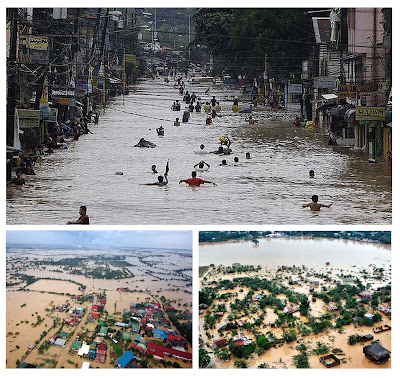Living in a tropical country, it is inevitable to have rains, storms and hurricanes regularly. They are very common in the Philippines. And sadly, when I say disaster, I mean devastation. Loss of life, loss of livelihood, agriculture, infrastructures, etc. Hurricanes with wind speed of 150-200 kph. There are floods everywhere.
Most of our fellowmen had sought refuge in designated evacuation centers. But since disaster struck when you least expect it, most of them are unprepared. Sure, we are used to storms and rains, but floods that rose in few minutes time, no one would anticipate that.
The monsoon rain brought hundreds of millimeters worth of rain in just 3 days, equivalent to the normal monthly rainfall.
Now, why am I saying that?
When it's an "Act of God", people always lose. They felt neglected, outraged, and alone during times of calamity. They're lost. They don't know where to start and what to do. If you lived in one of the flood prone areas, you may say you are used to the flood, but if there is a better way of living, you would still choose it. The best one can do is to prepare.
Preparing for hurricanes:
Non-Flood-Prone Areas
- Don't panic.
- Watch the news for updates on the storm.
- Before the storm hits your location, check your house. If the wind exceeds 50kph, put a firm, heavy stone (hollow blocks) or tires on your roof, just in case.
- Check plugs for exposed circuits
- Turn the main switch off in case of blackouts during heavy rains.
- Charge your cellphones, emergency lamps, radios, etc.
- Stock candles
- Stock food, good for few days, until the storm passes.
- Fill your car with gas (full tank).
Flood-Prone Areas:
- Same as above.
- Place your appliances, particularly refrigerators, higher (placing them on a sturdy table, on the second floor, etc.)
- Move your car to a higher ground with full tank.
Should you need to evacuate, what to bring:
- If staying with friends / neighbors
- Pack extra clothes (in a waterproof backpacks) good for a few days.
- Place in a plastic (ziplock) all pertinent documents and place in your bag.
- Also pack, ready-to-cook meals or canned goods, rice, etc.
- Cellphones, radios, chargers, lamps, extra batteries, flashlights, etc.
- Bring some cash
- If staying in the evacuation centers:
- Aside from stated above, if possible, also in a waterproof container or plastic, pack some beddings (mats) and blankets, light enough to bring but enough to keep you and your family warm.
- Although it is not required, you can also bring cooking utensils in the evacuation center (again, not required).
 |
| Photos found in Google Images |
When disaster comes, we feel helpless. It is out of our control. But trust God. We can overcome all disasters. Keep praying and Stay safe.







No comments:
Post a Comment